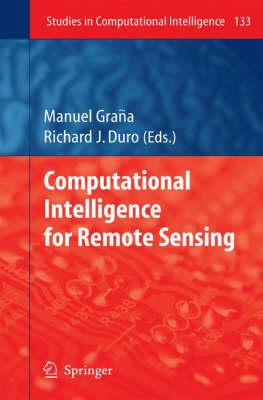Studies in Computational Intelligence
1 primary work
Book 133
Computational Intelligence for Remote Sensing
Published 5 June 2008
This book is a composition of diverse points of view regarding the application of Computational Intelligence techniques and methods into Remote Sensing data and problems. It is the general consensus that classi?cation, and related data processing, and global optimization methods are the main topics of Compu- tional Intelligence. Global random optimization algorithms appear in this book, such as the Simulated Annealing in chapter 6 and the Genetic Algorithms p- posedinchapters3and9. Muchofthecontentsofthe bookaredevotedto image segmentationandrecognition,using diversetoolsfromregionsofComputational Intelligence, ranging from Arti?cial Neural Networks to Markov Random Field modelling. However, there are some fringe topics, such the parallel implem- tation of some algorithms or the image watermarking that make evident that thefrontiersbetweenComputationalIntelligenceandneighboringcomputational disciplines are blurred and the fences run low and full of holes in many places. The book starts with a review of the current designs of hyperspectral sensors, more appropriately named Imaging Spectrometers.
Knowing the shortcomings and advantages of the diverse designs may condition the results on some app- cations of Computational Intelligence algorithms to the processing and und- standing of them Remote Sensing images produced by these sensors. Then the book contentsmovesinto basic signalprocessing techniquessuch ascompression and watermarking applied to remote sensing images. With the huge amount of remotesensinginformationandtheincreasingrateatwhichitisbeingproduced, itseems only naturalthatcompressiontechniques willleapintoa prominentrole in the near future, overcoming the resistances of the users against uncontrolled manipulation of "their" data. Watermarkingis the way to address issues of o- ership authentication in digital contents.
Knowing the shortcomings and advantages of the diverse designs may condition the results on some app- cations of Computational Intelligence algorithms to the processing and und- standing of them Remote Sensing images produced by these sensors. Then the book contentsmovesinto basic signalprocessing techniquessuch ascompression and watermarking applied to remote sensing images. With the huge amount of remotesensinginformationandtheincreasingrateatwhichitisbeingproduced, itseems only naturalthatcompressiontechniques willleapintoa prominentrole in the near future, overcoming the resistances of the users against uncontrolled manipulation of "their" data. Watermarkingis the way to address issues of o- ership authentication in digital contents.
